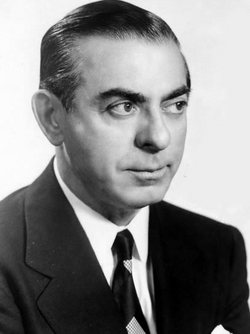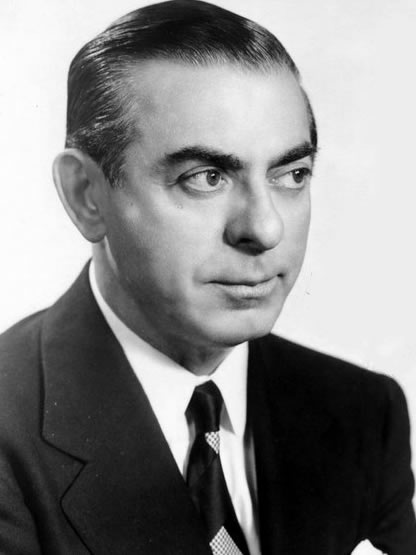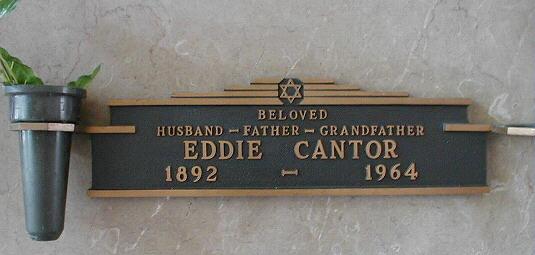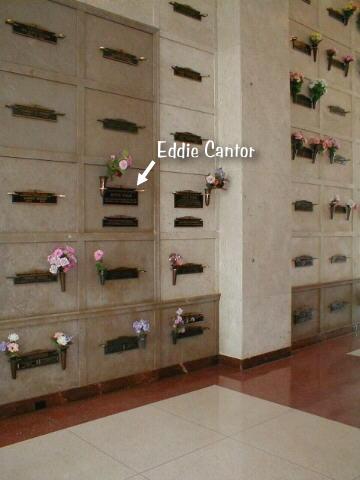Actor, Comedian, Dancer, Film Producer, Screenwriter, Composer, Author. Born Isidore Iskovitz on New York's Lower East Side to Russian-Jewish immigrant parents, young Izzie was orphaned early on, and was raised by his maternal grandmother Esther Kantrowitz, who supported herself and her grandson; enrolling him in school whereby school officials listed him under his grandmother's surname, Kantrowitz. A teen-aged Izzie knew where his destiny lay once he won a Bowery Theatre Amateur Night. He found moderate success as a billed vaudeville player under the name of Eddie Cantor (a name suggested by his future wife, Ida, as she didn't think "Izzie" was a good name for an actor). Eddie didn't truly find success until he was hired for "Ziegfeld's Midnight Frolics" in 1917. He began making phonograph records in 1917, recording both comedy songs and routines and popular songs of the day, under several labels: Victor, Pathé and Emerson. From 1921 through 1925 he had an exclusive contract with Columbia Records, returning to Victor until 1930. He continued with the Ziegfeld Follies throughout the 1920s as well, working with W.C. Fieldsand Will Rogers. After making his movie debut in a DeForest Phonofilm talking short subject in 1922, he starred in a pair of silent films, "Kid Boots" (1926) and "Special Delivery" (1927). Later, he went under contract to Samuel Goldwyn. Eddie turned out a string of big-budget musicals within a six year span: "Whoopee" (1930), "Palmy Days" (1931), "The Kid From Spain" (1932), "Roman Scandals" (1933), "Kid Millions" (1934), and "Strike Me Pink" (1936). Cantor introduced such songs as "If You Knew Susie," "Dinah," and "Makin' Whoopee." Working for the war effort, Cantor remained popular throughout the 1940s hosting his long-running radio program, "Time To Smile" and during the 1950s he was one of the alternating hosts of the NBC television show The Colgate Comedy Hour. Joining the American Society of Composers, Authors and Publishers (ASCAP) in 1951, earlier in his career co-wrote one of the most played songs of all time: "Merrily We Roll Along" (The Warner Brothers cartoon theme) and his song compositions also include "Get a Little Fun Out of Life," "It's Great to Be Alive," and "The Old Stage Door." He founded the March of Dimes, as well as working on behalf of dozens of charities with his wife Ida. He regularly put his career on the line through his union activities with Actors Equity, the Screen Actors Guild (of which he served as president 1933-1935), the American Federation of Radio Artists, and flew in the face of bigotry and anti-Semitics through his work with the B'nai Brith and Jewish Relief. During his long career, Cantor wrote eight books, including "Caught Short" (about the Crash of 1929) and his autobiography, "My Life is in Your Hands." The Academy of Motion Picture Arts And Sciences (AMPAS) bestowed an honorary award in 1956 to Eddie Cantor for "distinguished service to the film industry." In 1962, the nation of Israel gave him the Medallion of Valor for his extraordinary efforts on behalf of the people. He was awarded three 'Stars' on the Hollywood Walk of Fame for Motion Pictures at 6648 Hollywood Boulevard; for Television at 1710 Vine Street; and for Radio at 6765 Hollywood Boulevard in Hollywood, California. Eddie and his wife Ida had five children together. He remained married to Ida until her death in 1962.
Actor, Comedian, Dancer, Film Producer, Screenwriter, Composer, Author. Born Isidore Iskovitz on New York's Lower East Side to Russian-Jewish immigrant parents, young Izzie was orphaned early on, and was raised by his maternal grandmother Esther Kantrowitz, who supported herself and her grandson; enrolling him in school whereby school officials listed him under his grandmother's surname, Kantrowitz. A teen-aged Izzie knew where his destiny lay once he won a Bowery Theatre Amateur Night. He found moderate success as a billed vaudeville player under the name of Eddie Cantor (a name suggested by his future wife, Ida, as she didn't think "Izzie" was a good name for an actor). Eddie didn't truly find success until he was hired for "Ziegfeld's Midnight Frolics" in 1917. He began making phonograph records in 1917, recording both comedy songs and routines and popular songs of the day, under several labels: Victor, Pathé and Emerson. From 1921 through 1925 he had an exclusive contract with Columbia Records, returning to Victor until 1930. He continued with the Ziegfeld Follies throughout the 1920s as well, working with W.C. Fieldsand Will Rogers. After making his movie debut in a DeForest Phonofilm talking short subject in 1922, he starred in a pair of silent films, "Kid Boots" (1926) and "Special Delivery" (1927). Later, he went under contract to Samuel Goldwyn. Eddie turned out a string of big-budget musicals within a six year span: "Whoopee" (1930), "Palmy Days" (1931), "The Kid From Spain" (1932), "Roman Scandals" (1933), "Kid Millions" (1934), and "Strike Me Pink" (1936). Cantor introduced such songs as "If You Knew Susie," "Dinah," and "Makin' Whoopee." Working for the war effort, Cantor remained popular throughout the 1940s hosting his long-running radio program, "Time To Smile" and during the 1950s he was one of the alternating hosts of the NBC television show The Colgate Comedy Hour. Joining the American Society of Composers, Authors and Publishers (ASCAP) in 1951, earlier in his career co-wrote one of the most played songs of all time: "Merrily We Roll Along" (The Warner Brothers cartoon theme) and his song compositions also include "Get a Little Fun Out of Life," "It's Great to Be Alive," and "The Old Stage Door." He founded the March of Dimes, as well as working on behalf of dozens of charities with his wife Ida. He regularly put his career on the line through his union activities with Actors Equity, the Screen Actors Guild (of which he served as president 1933-1935), the American Federation of Radio Artists, and flew in the face of bigotry and anti-Semitics through his work with the B'nai Brith and Jewish Relief. During his long career, Cantor wrote eight books, including "Caught Short" (about the Crash of 1929) and his autobiography, "My Life is in Your Hands." The Academy of Motion Picture Arts And Sciences (AMPAS) bestowed an honorary award in 1956 to Eddie Cantor for "distinguished service to the film industry." In 1962, the nation of Israel gave him the Medallion of Valor for his extraordinary efforts on behalf of the people. He was awarded three 'Stars' on the Hollywood Walk of Fame for Motion Pictures at 6648 Hollywood Boulevard; for Television at 1710 Vine Street; and for Radio at 6765 Hollywood Boulevard in Hollywood, California. Eddie and his wife Ida had five children together. He remained married to Ida until her death in 1962.
Bio by: katzizkidz
Inscription
Beloved Husband - Father - Grandfather
Family Members
Advertisement
See more Cantor memorials in:
Explore more
Sponsored by Ancestry
Advertisement










